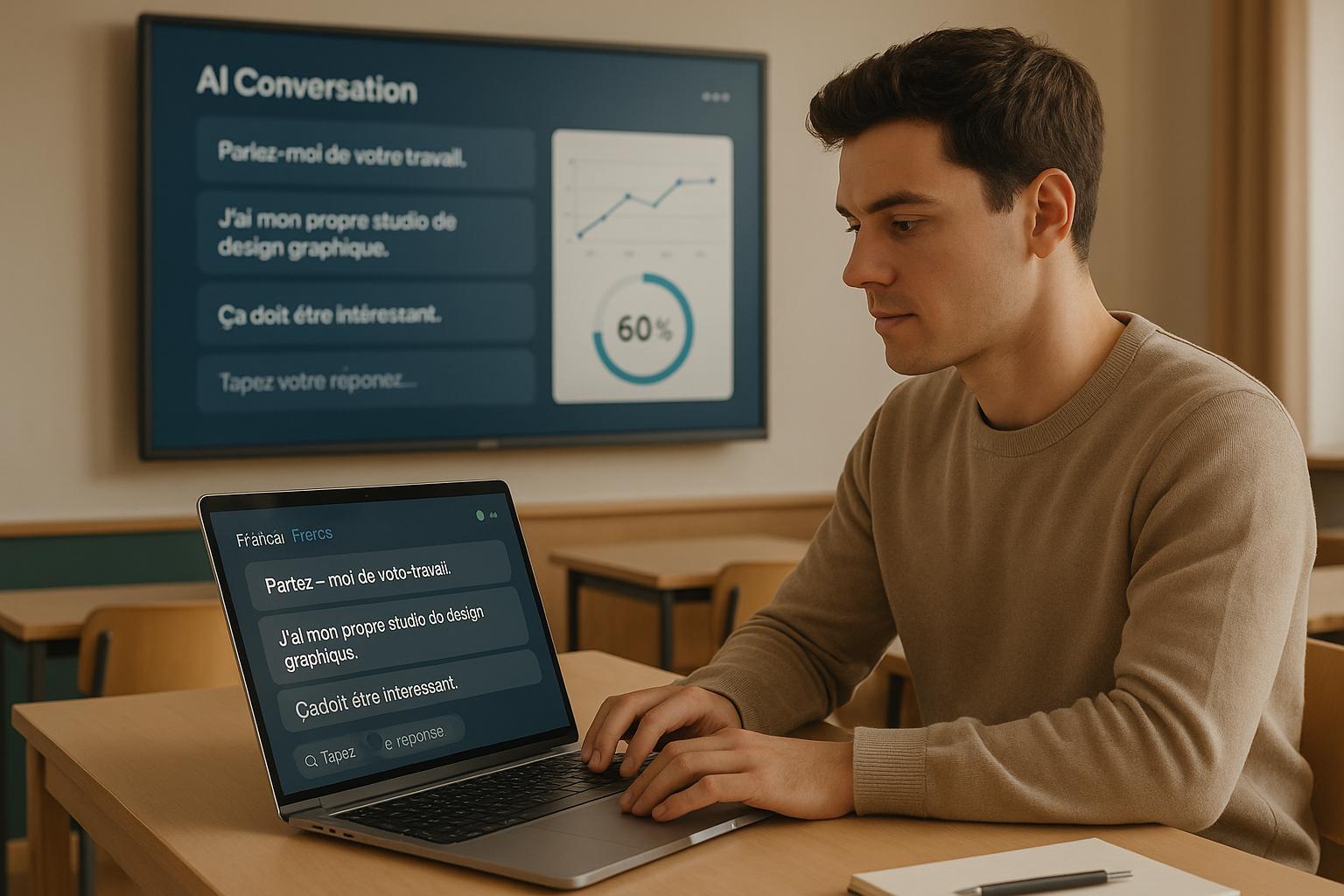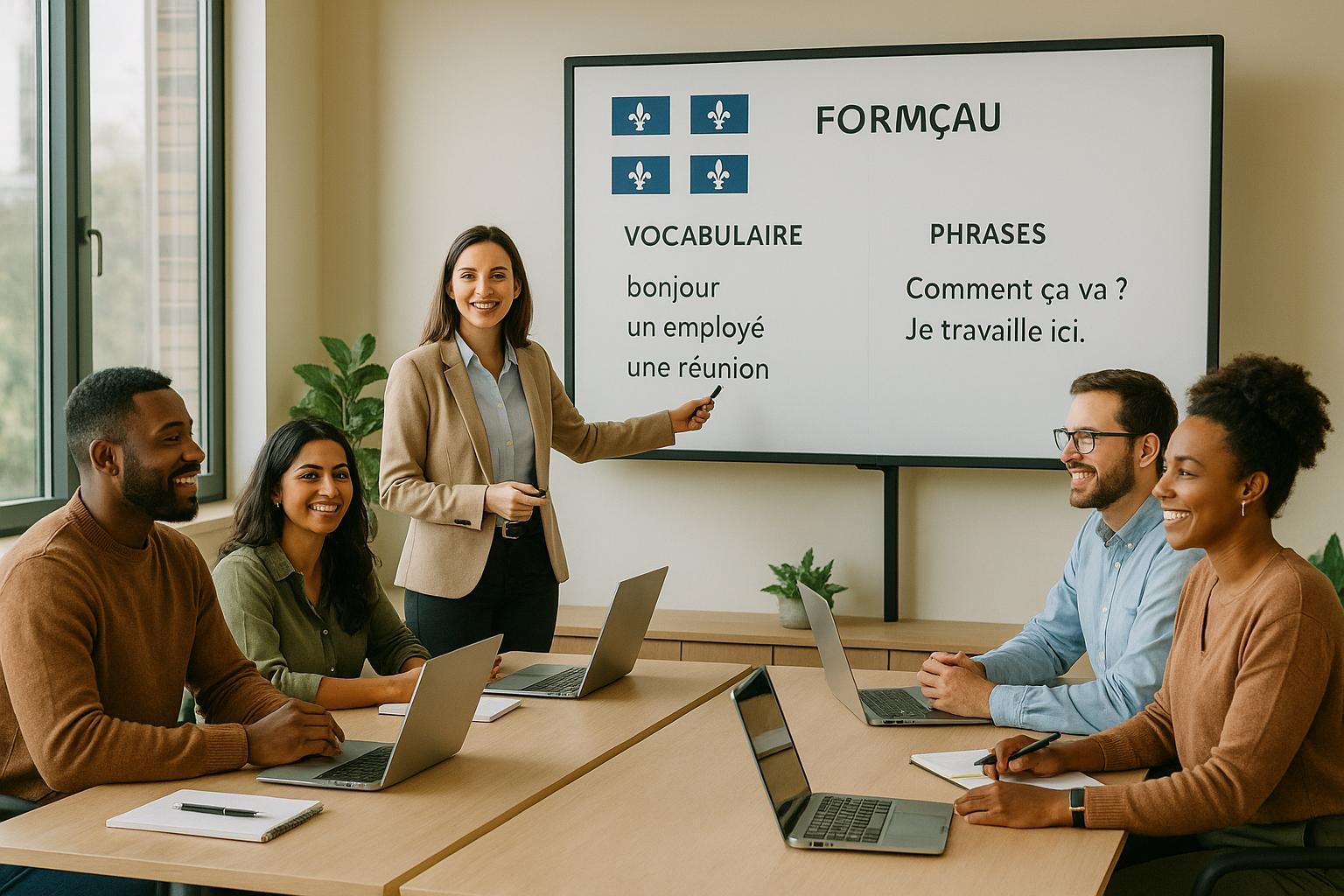AI Tools for French Workplace Integration
Learn how to prepare for OQLF audits by documenting language proficiency, utilizing AI tools, and implementing tailored training programs.

AI Tools for French Workplace Integration
AI tools are transforming how French workplaces integrate non-French speakers, addressing language barriers, legal compliance, and employee retention challenges. Here's what you need to know:
- 73% of companies using AI report better employee performance, while 74% see improved skill development.
- AI tools help meet French language laws like Bill 96, which require businesses to prioritize French in communication and documentation.
- Solutions like Francoflex offer personalized language training, compliance tracking, and scalability for teams of all sizes.
- 30% of French companies already use AI for workplace challenges, with many seeing productivity gains and smoother communication.
Ensuring Language Compliance with AI Tools
Challenges in Multilingual Workplaces
In French-speaking regions, businesses face hurdles in meeting language requirements while maintaining smooth communication and fostering workplace harmony. These issues affect efficiency, legal compliance, and team dynamics.
Compliance with Language Laws (e.g., Bill 96)

Bill 96 enforces strict French language rules, requiring businesses to prioritize French in internal communication, documentation, and customer interactions. Companies must provide training, track their progress, and ensure adherence to avoid heavy fines. AI tools can simplify this process by automating documentation and creating customized training programs.
Communication Barriers and Productivity
Language differences can disrupt productivity, causing delays, miscommunication, and errors. Teams often spend extra time addressing these issues, which impacts collaboration and project timelines. AI-powered tools, such as real-time translators and language learning platforms, can help overcome these barriers.
"Over 30% of French companies have already integrated AI tools to address language and other workplace challenges, with 73% reporting positive effects on employee performance" [1]
Employee Retention and Workplace Culture
Language barriers can make it harder to retain employees and build a cohesive workplace. Non-French speakers may feel excluded, face limited growth opportunities, and struggle to participate in team activities or cultural events. This often leads to lower engagement and higher turnover, driving up recruitment and training expenses. AI solutions can offer personalized learning paths, helping employees feel more included and improving their overall experience.
These challenges underscore the need for practical tools, like AI-driven solutions, to support language integration in the workplace.
AI Tools and Workplace Integration Challenges
AI-powered tools are reshaping how businesses tackle French language integration in the workplace. These technologies address common hurdles while offering scalable solutions tailored to different organizational needs.
Personalized Learning
AI makes language training more tailored than ever. By analyzing an employee's native language, current French skills, and job requirements, these tools create customized learning paths. They adjust content, vocabulary, and pacing based on individual progress and workplace demands.
Take Francoflex as an example. This platform adapts training to specific roles, keeping it relevant and engaging. Customer service staff might practice client conversations, while technical employees focus on job-specific terms.
"Over 34% of companies with over 100 employees have already integrated AI tools for language learning, with this number rising to 45% for organizations with more than 200 employees" [1]
This personalized approach not only enhances learning for individuals but also scales efficiently to fit organizations of any size.
Scalability for Different Team Sizes
AI tools can handle up to 50,000 users while maintaining consistent training quality. Whether you're running a small startup or a large enterprise, these platforms adapt to varying team structures and resource demands without compromising the learning experience.
Compliance with Legal Requirements
Meeting legal standards is another area where AI tools excel. They automate progress tracking, generate certification reports, and ensure adherence to compliance goals. Key features include:
- Tracking individual and team progress in language skills
- Producing documentation for OQLF certification
- Monitoring compliance milestones
- Offering standardized evaluation methods
Platforms like Francoflex demonstrate how AI can simplify compliance while addressing workplace language integration challenges effectively.
Case Study: Using Francoflex for French Integration

Francoflex combines AI-driven learning and compliance tools to make French workplace integration easier. It offers features like AI-powered daily conversations, role-specific vocabulary training, tailored learning paths, compliance tracking for Bill 96, and progress documentation for OQLF certification. This approach helps companies meet language requirements while creating a more inclusive workplace.
Features and Tools
Francoflex allows organizations to start language training right away, avoiding the usual delays. Its standout tools include:
- 24/7 personalized AI conversations for continuous practice
- Customizable training based on specific roles
- Automated compliance tracking and reporting
- Team progress monitoring
- Analytics to track language improvement across teams
By breaking down communication barriers, Francoflex supports a workplace culture where multiple languages can thrive.
Pricing Options
Francoflex offers three plans tailored to different business sizes:
- Basic: Ideal for small teams
- Business: Designed for mid-sized companies and includes compliance tools
- Enterprise: Built for large organizations, offering advanced analytics and support for up to 50,000 users
Each plan includes essential AI features, with options that grow alongside your business. Francoflex makes it simple to integrate French language tools into your workplace systems.
Strategies for Implementing AI-Powered Language Tools
Implementing AI language tools effectively requires planning and a clear strategy. Recent data highlights the importance of a structured approach to make the most of these technologies.
Integration with HR Systems
Integrating AI language tools with HR systems starts with evaluating current platforms. Organizations need to ensure these tools can connect smoothly with existing HR software to track employee progress and meet compliance needs. This process should focus on automating data collection for language assessments and compliance reporting.
Key areas to address include:
- Data Management: HR teams must create clear protocols for managing language assessment data. This involves setting up automated systems for tracking employee progress and generating standardized compliance reports, such as those required under Bill 96.
- System Compatibility: It's crucial to confirm that AI tools work seamlessly with current HR platforms. This ensures smooth data sharing and avoids disruptions.
Once integrated, employees need proper training to use these tools effectively.
Training Employees on AI Tools
Employee training is a cornerstone of successful AI adoption. A study found that two-thirds of French companies implementing AI provided detailed training for their teams [1]. Training should focus on practical, hands-on learning.
Here’s what companies find most effective:
| Training Component | Purpose |
|---|---|
| Initial Workshop | Introduce basic features and functions |
| Guided Practice | Offer hands-on experience |
| Peer Support | Build an internal support network |
| Regular Check-ins | Address concerns and track progress |
Custom training programs help employees feel confident using AI tools to improve their French communication skills, creating a more inclusive work environment.
Monitoring Progress and Feedback
Regular monitoring helps organizations track the success of AI tools. Data shows that 73% of companies reported better employee performance after introducing AI tools [1]. Monitoring also provides valuable feedback for continuous improvement.
Effective strategies include:
- Conducting monthly evaluations with AI-generated reports to measure language proficiency and pinpoint areas for growth.
- Collecting employee feedback through surveys and open discussions to understand their experience.
Companies that prioritize consistent monitoring often achieve better results in meeting language compliance goals. Not only does this help with regulations like Bill 96, but it also fosters a workplace culture that supports multilingual communication. In fact, 74% of organizations believe AI tools play a key role in enhancing employee skills [1].
Conclusion: AI and Future Workplace Integration
AI-powered language tools are transforming how French workplaces approach integration, offering solutions to navigate legal, cultural, and operational hurdles effectively.
Here's how AI is making an impact:
Compliance and Legal Requirements: AI tools help businesses meet Bill 96 standards by automating certification processes and tracking progress. This not only ensures compliance but also supports employee development.
Workplace Efficiency: Companies using AI-driven tools report improved communication and productivity. These tools scale to fit businesses of all sizes, from small startups to enterprises with tens of thousands of employees.
Preparing for the Future: The French government’s focus on AI training and career development [2] complements modern AI tools. By blending personalized learning, flexible schedules, and progress tracking, businesses can create strong multilingual teams that adapt to evolving workplace demands.
The future of workplace integration in France will hinge on how well companies implement AI tools while addressing employee concerns. Organizations that prioritize thoughtful strategies and engagement will be at the forefront of building inclusive, multilingual environments.






